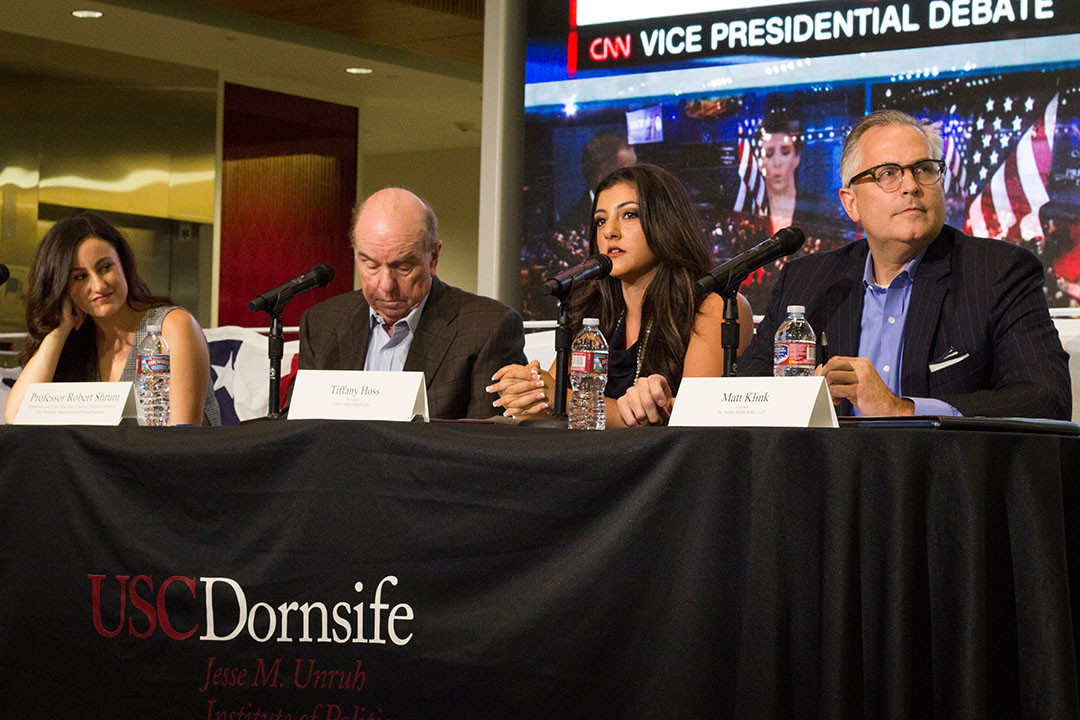Vice Presidential candidates face off

Florence Hui | Daily Trojan
Running mate rivalry · Panelists Bob Shrum (left), Tiffany Hoss (center) and Matt Klink (right) spoke before and after the Vice Presidential Debate Tuesday to discuss the candidates’ positions and performance at the debate.
Students gathered to watch the first and only vice presidential debate screening and panel hosted by the Unruh Institute of Politics at Wallis Annenberg Hall Tuesday evening.
The panel featured former President of USC College Democrats Christina Wilkes, USC Political Science Professor Robert Shrum, President of USC College Republicans Tiffany Hoss and partner at public affairs firm Ek, Sunkin, Klink & Bai Matt Klink.
Professor Dan Schnur and Daily Trojan Associate Managing Editor Danni Wang moderated the panel.
Prior to the debate, Schnur questioned the panelists about the ways each candidate could succeed in the debate.
“The stakes are much higher for Mike Pence, and the biggest challenge he has is that he has to give his running mate a hand up from a pretty dismal performance from a week ago,” Klink said. “As long as Tim Kaine continues along the path Hillary Clinton has set up, he will be good.”
For Wilkes, the vice presidential debate was important for the Clinton campaign.
“Tonight is an opportunity for Kaine to serve as a moral authority, because he is well-liked and well-respected, and he can prove to voters that Secretary Clinton is worthy of their votes and their trust,” Wilkes said.
Schnur started the post-debate panel by affirming the panel’s pre-debate predictions that Trump would dominate the conversation.
“Tim Kaine did a better job of leveling criticism against Donald Trump than Hillary Clinton did in the presidential debate and Mike Pence did a better job of defending Donald Trump than Donald Trump [himself] did in the presidential debate,” Schnur said.
He posed the question of whether this focus on the presidential candidates, and Trump in particular, changed the trajectory of the debate.
Shrum disagreed with this assessment of Pence’s defense of Trump.
“I think Pence did a horrible job of defending Donald Trump and he mostly declined to defend Donald Trump,” Shrum said. “The press will generally say he ‘won’ the debate, but I think it was a big test for him to defend Trump and all these things Trump has [said]. I think he failed that test.”
Hoss, in contrast, believed that Pence was able to remain neutral.
“Kaine was the dominant force and he did overpower [Pence] in a lot of ways, as Pence had a lot of opportunities to respond … and he didn’t seize those opportunities,” Hoss said.
The moderators then opened the floor to audience questions. Kira Stiers, a sophomore majoring in political science and international relations, said that Pence was set up for failure because she believed it is very difficult to defend Trump’s statements.
“The campaign clearly made it a strategic decision that they were not going to take the bait of Tim Kaine and try to spend [Pence’s] very scarce debate time responding to charges leveled against him for things that Trump said or allegedly said,” Klink said in response. “What you saw Mike Pence do was what Trump should have done a week ago: instead of talking about the actual question that was asked, respond to the question that you want to answer, and you saw Pence try to paint a stark picture of Hillary Clinton.”
The discussion concluded with a brief look forward at the next presidential debate, which will take place Oct. 9 in the form of a town hall meeting.
